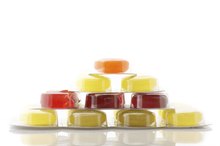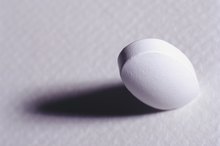What does fact checked mean?
At Healthfully, we strive to deliver objective content that is accurate and up-to-date. Our team periodically reviews articles in order to ensure content quality. The sources cited below consist of evidence from peer-reviewed journals, prominent medical organizations, academic associations, and government data.
- Linus Pauling Institute at Oregon State University; Zinc; Jane Higdon; December 2008
- Linus Pauling Institute at Oregon State University; Vitamin B12; August 2007
The information contained on this site is for informational purposes only, and should not be used as a substitute for the advice of a professional health care provider. Please check with the appropriate physician regarding health questions and concerns. Although we strive to deliver accurate and up-to-date information, no guarantee to that effect is made.
What Foods Have Zinc and Cobalt in Them?
Zinc aids in cellular and immune functioning and growth and development. Cobalt enters the body in the form of vitamin B-12, present in most animal products, and aids in the production of red blood cells. Cobalt serves similar functions as zinc and can replace zinc in various enzymatic processes. While no recommended dietary allowance is established for cobalt, the recommended daily allowance for zinc is 11 mg for men and 8 mg for women with the upper limit set at 40 mg, according to Linus Pauling Institute. Consuming at least 2.8 µg of vitamin B-12 daily can ensure you are ingesting enough cobalt.
Shellfish
One of the best sources of zinc and vitamin B-12 is shellfish. Six medium-sized oysters, the richest source of zinc, contain 76.3 mg of zinc and 30 µg of vitamin B-12, according to Linus Pauling Institute and University of Florida 123. A 3-oz. serving of crab contains 4.7 mg of zinc and 8.8 µg of vitamin B-12. Other shellfish rich in zinc and vitamin B-12 include shrimp, clams, mussels and lobster.
- One of the best sources of zinc and vitamin B-12 is shellfish.
- Other shellfish rich in zinc and vitamin B-12 include shrimp, clams, mussels and lobster.
Poultry and Red Meat
Side Effects of Zinc Lozenges
Learn More
Poultry is excellent sources of zinc and vitamin B-12. A 3-oz. serving of dark-meat chicken and turkey contains 1.8 and 3.8 mg of zinc, respectively, and 0.3 µg of vitamin B-12, according to Linus Pauling Institute. Red meats, such as beef and pork, provide significant quantities of zinc and vitamin B-12. A 3-oz. serving of beef provides 6 mg of zinc and 2.1 µg of vitamin B-12, while a 3-oz. serving of pork contains 2.2 mg of zinc and 0.51 µg of vitamin B-12.
- Poultry is excellent sources of zinc and vitamin B-12.
- serving of dark-meat chicken and turkey contains 1.8 and 3.8 mg of zinc, respectively, and 0.3 µg of vitamin B-12, according to Linus Pauling Institute.
Dairy Products
Dairy products provide adequate quantities of zinc and vitamin B-12. Certain cheeses, such as:
- ricotta
- Swiss
- cheddar
- brie
- gouda
- are rich in zinc
- as well as vitamin B-12
One ounce of cheddar cheese provides 0.9 mg of zinc and 0.24 µg of vitamin B-12. One cup, or 8 oz., of fruit yogurt contains 1.8 mg of zinc and 1.3 µg of vitamin B-12. One cup of milk includes 1.8 mg of zinc and 0.9 µg of vitamin B-12, according to Linus Pauling Institute.
- Dairy products provide adequate quantities of zinc and vitamin B-12.
- One cup of milk includes 1.8 mg of zinc and 0.9 µg of vitamin B-12, according to Linus Pauling Institute.
Eggs
Retinol Rich Foods
Learn More
Eggs are an animal byproduct, which indicates the presence of vitamin B-12. One cooked egg contains 0.5 µg of vitamin B-12, according to Northwestern University 2. Additionally, eggs provide significant quantities of zinc. One large, raw egg provides 2.7 mg of zinc and 3.13 µg of vitamin B-12, according to the University of Rochester Medical Center 24.
Related Articles
References
- Linus Pauling Institute at Oregon State University; Zinc; Jane Higdon; December 2008
- University of Utah: Cobalt
- Linus Pauling Institute at Oregon State University; Vitamin B12; August 2007
- University of Rochester Medical Center: Nutrition Facts
- Mayo Clinic Laboratories, Test ID ZNS, Zinc, Serum
- Nakamura H, Sekiguchi A, Ogawa Y, Kawamura T, Akai R, Iwawaki T et al. Zinc deficiency exacerbates pressure ulcers by increasing oxidative stress and ATP in the skin.J Dermatol Sci. 2019 Jul 12. pii: S0923-1811(19)30197-5. doi: 10.1016/j.jdermsci.2019.07.004. [Epub ahead of print]
- National Institutes of Health, Office of Dietary Supplements, Zinc, Fact Sheet for Health Professionals
Writer Bio
Suzanne Allen has been writing since 2004, with work published in "Eating for Longevity" and "Journal of Health Psychology." She is a certified group wellness instructor and personal trainer. Allen holds a Bachelor of Arts in communication and information sciences, a Bachelor of Arts in psychology and a Master of Arts in clinical psychology.









